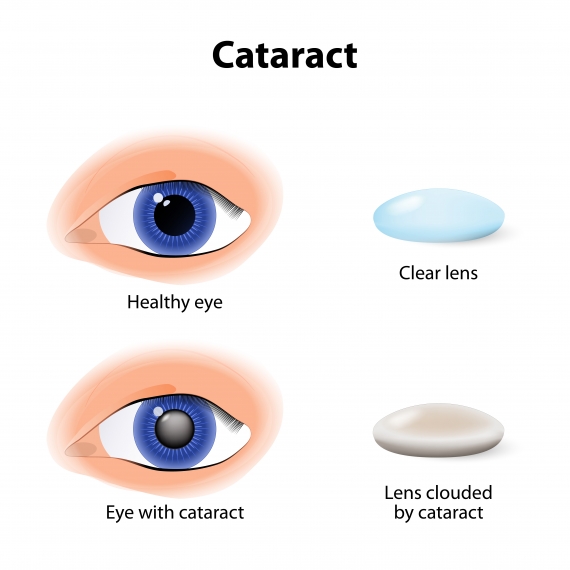What is a Cataract?
Cataracts are cloudy areas in the normally clear lens of the eye. The most common cause of cataracts is aging. The good news about cataracts is that they are curable. If you are concerned that you may have a cataract or need more information about what can be done about them, Elmquist Eye Group can help.
Dr. E. Trevor Elmquist of Elmquist Eye Group in Cape Coral and Fort Myers is an experienced board certified ophthalmologist. Dr. Kate Wagner, his partner, and Dr. Nina Burt are board certified optometrists. No matter what type of concern you may have about your eyes, our talented team offers a full range of vision care, from routine exams for glasses to bladeless laser-assisted cataract surgery.
 About Cataracts
About Cataracts
The lens of your eye is normally transparent. This enables light to pass easily through it to the retina, where images of what you are seeing are processed and sent to the brain via the optic nerve.
The lens is made up mostly of water and protein. As we grow older, the natural proteins may begin to clump together, making some or all of the lens cloudy. This makes it difficult for the light to travel through the lens, and the images processed by the retina are no longer clear.
Cataracts can develop in one eye or in both eyes. They are not caused by overuse of your eyes and do not travel from one eye to the other.
According to the American Academy of Ophthalmology, over 24.5 million Americans aged 40 and older are affected by cataracts. And by the year 2050, it is estimated that 50 million Americans will have them.
What Causes Cataracts?
The most common cause of cataracts is aging, but there are other causes. A traumatic cataract can result from an injury to the eye. Cataracts may also be caused by some medications, such as prednisone and corticosteroids, and by certain diseases, such as diabetes. And, although uncommon, it is possible for babies to be born with cataracts or develop them during their first year of life.
Cataract Symptoms
It’s quite possible that you may not even realize you have a cataract because they usually develop slowly. It may take many years to notice the changes in your vision, but the symptoms include:
- Cloudy or blurry vision
- Difficulty reading
- Poor night vision
- Sensitivity to light, glare, and halos around lights
- Frequent changes in glasses or contacts prescriptions
- Double vision in one eye
- Colors look faded or yellowed
The first evidence of cataracts is usually discovered during an examination. A cataract examination is very much like a general eye exam, but your eye doctor will dilate your pupils to thoroughly examine your eyes. He or she will also do a few extra tests, such as visual acuity and glare testing, to determine the severity of the cataract.
If cataracts are beginning to form, it’s important to make sure your glasses or contact lenses are strong enough to compensate for your impaired vision. As your cataracts develop further, you can discuss with Dr. Elmquist whether surgery would be beneficial.
Cataract Treatment
There is no treatment other than surgery for cataracts, but it is one of the safest surgeries performed in the U.S. today. And Elmquist Eye Group now offers bladeless laser-assisted cataract surgery which is designed to make the procedure even more precise, safe and accurate.
The cataract surgeon gently numbs the eye so that you won’t feel any discomfort. Then the laser is used to make tiny incisions on the cornea to reach the cloudy lens and carefully break it apart. The cataract is removed using gentle suction, and an artificial lens (intraocular lens or IOL) is inserted. There are multifocal IOLs available to help individuals see at all distances without the need for glasses, and special Toric lenses for people with astigmatism.
For more information about what can be done about cataracts or to find out if a cataract may be causing your vision problems, schedule an eye exam with Elmquist Eye Group to put your mind at ease. Call us today at (239) 936-2020 for an appointment.
